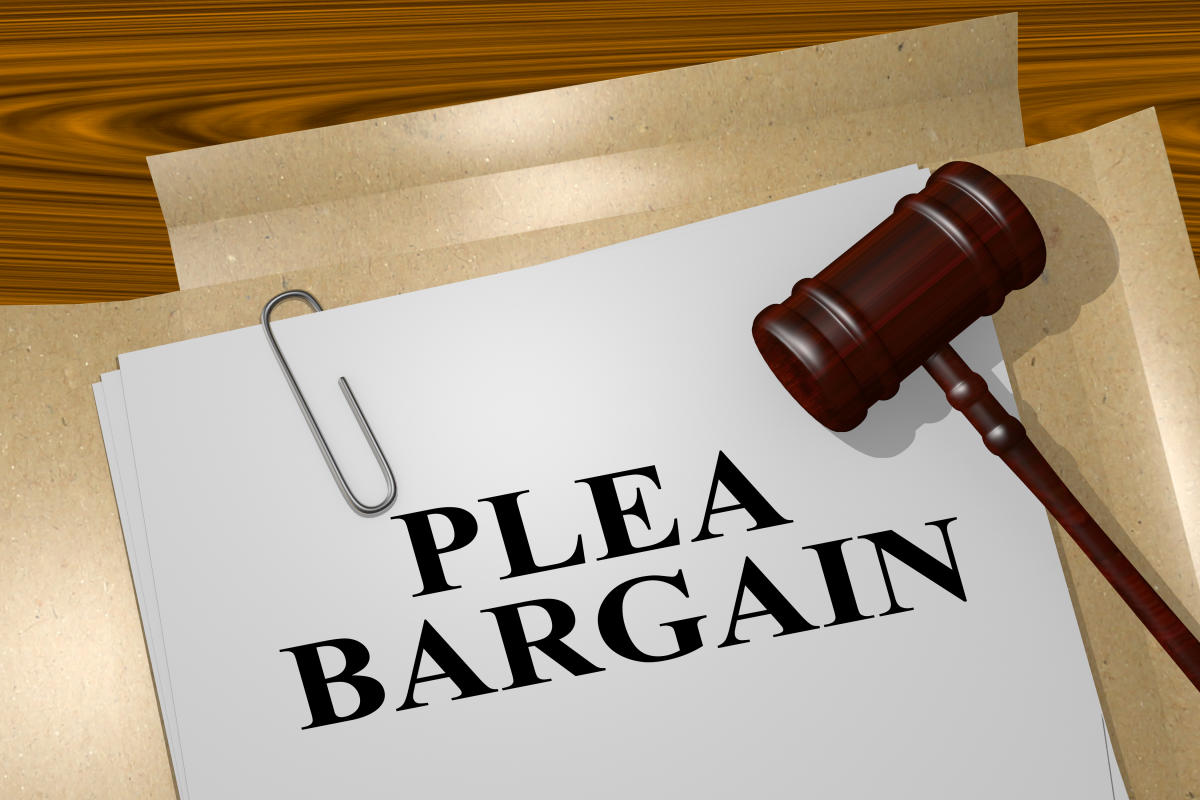What Your Lawyer Wants You to Know About Plea Bargains

Recent reports suggest that the vast majority (a whopping 98%) of criminal cases in U.S. federal courts end in a plea bargain. If you are facing criminal charges and have already procured a defense lawyer to help you with your case, there is a strong chance that your case will be resolved outside of court without ever going to trial. Of course, your attorney will know best whether or not entering into a plea bargain is the best course of action for your circumstances. However, if they do urge you to accept such a deal, it may be helpful to understand a little bit more about the nature and purpose of plea bargaining.
What is a Plea Bargain?
A plea bargain is an agreement between a defendant and a prosecutor in which the defendant agrees to plead guilty to some or all of the charges against them. In exchange for pleading guilty, the defendant is granted concessions from the prosecutor. Typically, “concessions” equate to a lighter punishment for the defendant. In plea bargains, the prosecutor can help lighten the defendant’s punishment by reducing the number or severity of charges laid against them. They can also recommend a lighter sentence.
In some cases, a plea bargain requires more than just a guilty plea. For example, a defendant may be offered a reduced sentence in exchange for testimony against another defendant in a different case. A plea bargain requires that a defendant relinquish three constitutional rights: the right to a jury trial, the right to protect oneself against self-incrimination, and the right to confront the prosecution’s witnesses.
Not guilty
When a defendant enters a not guilty plea, they are denying having committed the crime they are accused of. With a not guilty plea, the case will have to go to trial, and the prosecution will be required to prove beyond a reasonable doubt all aspects of the offense. If a not guilty verdict results, this would indicate that the prosecution did not meet the burden of proof in the trial. It does not necessarily mean that the defendant is truly innocent of the crime but merely not guilty for legal purposes.
Guilty
A guilty plea is just what it sounds like. When a defendant pleads guilty, they are admitting to the court that they have committed the crime(s) of which they are accused. In so doing, if the court accepts the plea, the defendant waives their right to a trial and goes straight to sentencing.
No contest
A no contest plea in court, also referred to as nolo contendere, is a defendant’s plea that they will not be contesting the charge(s) brought against them. While this is not an express admission of guilt, defendants entering a no contest plea waive their rights to a trial, and can expect the court to treat them as guilty for sentencing purposes. Such a plea does not act as an admission of guilt for any purposes outside of the trial for which it is entered and may not be used as an admission of guilt in related civil suits that may arise.
Alford
An Alford plea, sometimes also referred to as a “best-interests plea,” is when a formal guilty plea is entered in criminal court, while at the same time, the defendant refuses to admit their guilt and instead maintains that they are innocent. This is different from a no contest plea in that a formal guilty plea, in this case, can be used against the defendant in future lawsuits. It is similar to a no contest plea in that the defendant agrees to accept the consequences of a guilty verdict and will forgo a full criminal trial. An Alford plea is only used in felony cases.
What Else Can Be Bargained?
Prosecutors and defense lawyers may negotiate over the length and/or severity of a sentence. They may agree to drop certain charges if the defendant has been charged with multiple crimes. Or, they may bargain over the number of counts of each criminal charge if multiple counts of any of the charges have been laid against the defendant. Ultimately, if the accused is agreeing to enter a guilty plea and forgo a full criminal trial in order to receive a less severe punishment, one or more of these items will likely be on the bargaining table.
Sentence length
Lowering the length or severity of a sentence is the most obvious reason a defendant might agree to a plea bargain. Research suggests that defendants who refuse a plea deal, and are later convicted in court, are sometimes more likely to face harsher sentences. If, by pleading guilty, a defendant receives assurances that they will spend less time in jail or perhaps even receive a life sentence, as opposed to a death sentence, then admitting guilt and forgoing a lengthy public trial might be appealing. A prosecutor may recommend what sentence they think a defendant should receive, but the judge will be the one to decide whether or not to follow their recommendation.
Charges
When a defendant has been accused of multiple crimes, they may agree to plead guilty for one crime in exchange for having some or all of the other charges dropped. A defense lawyer would save time and resources by not having to defend each charge. Or, if someone has been charged with a very severe crime, they may agree to plead guilty to a lesser crime in order to have the more severe charge dropped. For example, as part of a plea deal, if someone were accused of murder, a prosecutor may agree to let them plead guilty to something with a less harsh punishment, such as manslaughter.
Counts
A person may be charged not only with multiple types of crime (assault, battery, manslaughter, murder, etc.) but with multiple counts of one or more types of crime. For example, if they murdered three people, they would be faced with three counts of murder. In order to get a conviction, a prosecutor may consent to lower the number of counts a defendant is charged with if they agree to plead guilty or no contest to one specific charge. As with lowering the number of charges, lowering the number of counts ultimately means less work for the defense attorney. It may mean less jail time or less severe punishment for the defendant.
How Many Criminal Cases End in a Plea Deal?
As stated earlier, recent research has found that 98% of criminal cases in U.S. federal courts end in a plea bargain, suggesting that the path of least resistance is greatly valued in the present U.S. legal system. The ABA Plea Bargain Task Force, a group of judges, defense attorneys, prosecutors, and academic professors tasked with examining the plea system, has indicated that plea bargaining has become the primary method of resolving criminal cases in the U.S. and that there are jurisdictions that have not had a single criminal trial in several years.
What Are the Benefits of a Plea Deal for the Prosecution?
Prosecutors benefit from plea bargains for several reasons. For starters, a plea bargain guarantees that they will get a conviction. Higher conviction rates bolster their appeal and credibility for potential future clients. Additionally, attorneys may like to avoid trials, as they can be expensive, labor-intensive, and time-consuming; and the outcome of a win is never guaranteed. Plea bargains remove the obstacle of a trial, which, in saving a prosecutor both time and financial resources, ultimately amounts to higher profits for them. In some cases, a plea bargain may also help with future, more impactful cases if a deal is made in exchange for testimony.
Does the judge have to accept plea bargains?
A plea bargain is a deal made between defense attorneys and prosecutors. Before their deal is made official, a judge will have to sign off on it. Even if both sides agree on all the terms, the judge does not have to accept a plea bargain. They have the power to approve or reject it. For a judge, there may be many reasons to accept a plea bargain, such as removing the need to determine guilt or pass down a ruling, mitigating the risk of a ruling being appealed or overturned, and general efficiency. When deciding whether to approve or reject a plea deal, a judge may also choose to accept only part of the deal. When this happens, it is called a partially negotiated plea. A defendant may not enter a plea until a judge has accepted the terms.
What Are the Benefits of a Plea Deal for the Defense?
As with prosecutors, a plea bargain provides a guaranteed outcome for defense attorneys. If a defendant is indeed guilty, it removes the need to go to trial, only to have a guilty verdict passed down in that public setting. A plea bargain saves a defense attorney money, labor, and resources. It leaves the potential for their clients to get more favorable sentencing than they might if they went to trial, and it even potentially gets their clients out of having to face jail time. If their client is ever charged with anything else, future judges and prosecutors would review any prior criminal record. Having a guilty or no contest plea on record is ultimately less damaging than a guilty conviction.
Can a defendant plead guilty even if they are not guilty?
Yes. A defendant can plead guilty, even if they are innocent of the crime they are accused of committing. There are a few reasons a person may choose to plead guilty when they are not. Because the outcome of a trial is never guaranteed, and the sentencing for a guilty conviction can be much harsher, they may decide not to risk a guilty verdict and public sentencing. They may be giving in to pressure or advice from their attorney. Or, they may simply want to forgo sitting through a trial.
When Are Plea Deals Negotiated?
In the majority of cases, negotiations for plea bargains may begin at any time throughout the process of a criminal lawsuit. They might start at the time of the arraignment or after the arrest but before the prosecution files criminal charges. Negotiations might occur during the preliminary hearing or even begin after a jury has gone to deliberate. A plea deal can be negotiated at any time before the jury’s verdict. In the case of a hung jury, it is not uncommon for the defense and prosecution to attempt to reach a plea deal instead of facing a second trial. There are also instances where a defendant has already been convicted, but the case is going through appeals, and at that time a plea bargain is reached.
Who decides to accept a plea bargain?
Either side may begin negotiations for a plea bargain. Still, the prosecution typically holds all the power in terms of deciding what concessions will be made, what charges will be brought against the defendant, etc. Once an agreement has been reached between the prosecution and the defense, it is up to the defendant to decide if they are willing to accept the terms of the plea bargain. Most often, defendants will accept the terms of a plea deal at the urging of their attorneys. The negotiating part of a plea bargain typically (though not always) takes place between the attorneys from each side, outside of court, and without any input from a judge. Once a plea is offered in open court, the judge will decide if they are comfortable with the proposed deal.
Are Plea Deals Legally Binding?
After a judge has given their approval for a plea bargain, it is considered to be a legally binding, enforceable contract between the defendant and the prosecution. If a defendant changes their mind after the agreement has been made, this would be considered a breach of contract, at which point the prosecution would no longer be legally bound to honor the commitments made in the plea bargain. If the prosecution backs out of the deal, the defendant may turn to the judge for assistance. In such a circumstance, the judge could require the prosecution to hold up their end of the deal, or they could decide to allow the defendant to change their guilty plea.
What is a conditional plea bail?
A conditional plea permits a defendant to enter a plea of guilty or no contest while also allowing the defendant to appeal a part of their case to a higher court. The higher court would then decide if the lower court made any errors in its judgment. If the higher court determines that the lower court did make mistakes, the defendant would then be permitted to withdraw their guilty or no contest plea. Conditional pleas are not accepted in every state. In some states, a defendant must enter a plea of not guilty if they wish not to waive their right to appeal parts of their case. Best practices for conditional pleas vary from state to state. However, as a general rule, they must be submitted in writing, and the defendant must obtain consent from both the state and the court before entering a conditional plea.
Can I change my plea if I accepted a plea deal?
More often than not, once a plea deal has been accepted, a defendant will not be able to go back and change their plea. In some states, however, a defendant may be permitted to change their plea before handing down judgment/sentencing. If you have entered into a plea bargain, and the judge does not agree with the negotiations made, you might be provided the opportunity to change your plea. There may also be rare circumstances where a defendant has a learning disability or some other mental impairment that prevents them from fully understanding the ramifications of entering a guilty plea. And lastly, if an officer of the law or a prosecutor is found to have violated the defendant’s constitutional rights at any point during the plea bargaining process, a defendant might possibly be permitted to withdraw their guilty plea. None of these exceptions are guaranteed.
Legal Resources for Defendants
If you’ve been accused of a crime, it is natural that you may have lots of questions about the next steps or what exactly you are being accused of. There are excellent resources online to help you find the best lawyer for your needs, and many helpful and free websites that can provide you with legal advice or information before meeting with a lawyer.
Find The Best Defense Attorney in Your Area
Expertise.com finds and reviews the top service professionals in over 200 industries across the U.S. each month. This includes finding and reviewing the top criminal defense attorneys around the country.
Find Free Online Legal Advice
The American Bar Association Free Legal Answers is a virtual legal advice clinic that provides an online version of the walk-in clinic model. Users may request brief advice and counsel about a specific civil legal issue from a volunteer lawyer by posting their civil legal questions to their state’s website. Lawyers will then follow up with basic legal advice and information, without the expectation of long-term representation. This is a great resource for people seeking advice and information about non-criminal legal matters, but cannot afford a lawyer.
You can contact the ABA through the ABA Service Center Hotline at (800) 285-2221 or email them at Service@americanbar.org, Monday - Friday, 9:00 AM - 6:00 PM ET.
Online Legal Dictionary
Wex is a free legal dictionary and encyclopedia sponsored and hosted by the Legal Information Institute at the Cornell Law School. The entries found here are collaboratively written and edited by legal experts and scholars. This resource is intended for use by a wide range of people, from students, to lawyers to people with no legal knowledge whatsoever. For web accessibility help, they can be emailed at liiaccessibility@cornell.edu.




